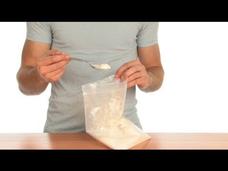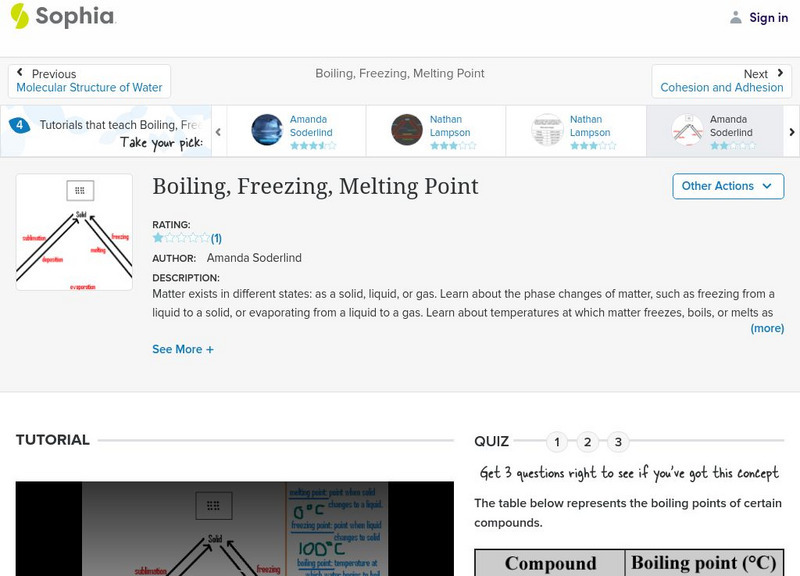Professor Dave Explains
Practice Problem: Colligative Properties
What are colligative properties? They're properties of a solution, such as freezing point depression and boiling point elevation, which differ from the pure solvent. Let's do some calculations regarding these concepts!
msvgo
Measurement of Time and Temperature
It describes time measuring instruments in ancient and modern period. It also explains how to measure temperature in a laboratory and clinic.
msvgo
Colligative Properties and Determination of Molar Mass
It discusses about the colligative properties of the solution and derives the relationship between vapour pressure of a solution, mole fraction and vapour pressure of solvent.
TMW Media
Temperature
This program covers the very important topic of temperature. We discuss temperature scales and why temperature is important when discussing chemical reactions. We also discuss how to convert from one temperature scale to the other. The...
Mazz Media
What is Freezing? (Simple English)
This live-action video program is about the word freezing. The program is designed to reinforce and support a student's comprehension and retention of the word freezing through the use of video footage, photographs, diagrams, and...
Professor Dave Explains
Converting Between Temperature Scales (Celsius, Fahrenheit, and Kelvin)
If you're American, you're familiar with the Fahrenheit scale, so 30 degrees is cold and 100 degrees is hot. But in the rest of the world, nobody uses this scale! They use Celsius, and to them, 30 is pretty darn hot. Furthermore,...
Mazz Media
Freeze
This live-action video program is about the word freeze. The program is designed to reinforce and support a student's comprehension and retention of the word freeze through use of video footage, photographs, diagrams and colorful,...
Catalyst University
Freezing Point Depression | Example #1
In this video, we work an example problem for freezing point depression in physical chemistry.
Curated Video
How Thermometers Measure Temperature
In this video, we learn about the history and functionality of thermometers. From Galileo Galilei's Thermoscope to today's alcohol or mercury-filled thermometers, we explore how temperature is measured using the movement of a colored...
Professor Dave Explains
Molality and Colligative Properties
Solute particles interfere with the physical processes a solution may undergo. These are known as the colligative processes of a solution. Ever wonder why we put salt on icy streets? Find out here!
Rock 'N Learn
Physical Science : Physical Changes Through Heating
Physical Science for Kids is the fun way to learn important facts about physical science and get ready for tests. Take a fascinating journey to the Super Science Station to learn about bioling, melting and heating different substances!
Wonderscape
Science Kids: States of Matter
Learn all about the states of matter - solid, liquid and gas. We explain the concepts of freezing, melting, evaporation, and condensation, and discuss the reversibility of physical changes. We also distinguish between physical and...
Visual Learning Systems
The Changing Phases of Matter: Solid to Liquid Phase Change
Upon viewing the The Changing Phases of Matter video series, students will be able to do the following:
Explain that phases of matter, also called states of matter, are the physical forms matter can take.
State the four phases of...
Rock 'N Learn
Physical Science for Kids - Lab Safety, Scientific Method, Atoms, Molecules, Electricity, and More
Physical Science for Kids is the fun way to learn important facts about physical science and get ready for tests. Take a fascinating journey to the Super Science Station to learn about lab safety, the scientific method, atoms, molecules,...
National Science Foundation
Science of the Winter Olympic Games: Science of Ice
Chemistry concepts come alive against the backdrop of the Sochi Olympic Winter Games! Here is a captivating clip to share with your chemistry kids. It teaches how the bonds in a water molecule contribute to the formation of a...
Khan Academy
Boiling Point Elevation and Freezing Point Depression, Chemistry
Have you ever wondered why cities in cold climates put salt on the roads to help keep ice from forming? In this chemistry video, Sal explains why the introduction of salt molecules suppresses, or delays, the formation of ice crystals...
TED-Ed
Under the Hood: The Chemistry of Cars
Ladies and gentlemen, start your engines! Explore the cumbustion reactions driving the world's automobiles and the chemical solutions used to keep their engines cool with this fun instructional video.
Steve Spangler Science
Homemade Ice Cream - Sick Science! #041
Here is the recipe for making ice cream in a couple of zip-top plastic bags. It is a fun way to demonstrate phase changes, especially when the weather is hot! Use this in your elementary science curriculum when introducing the states of...
Steve Spangler Science
Play and Freeze - Having Fun Making Ice Cream
Steve Spangler has created a toy that relies on science to make ice cream! He uses a ball with two cylinders inserted. One contains rock salt and water, while the other contains the ice cream ingredients. Once sealed, a family kicks the...
Steve Spangler Science
Instant Freeze - Soda Ice
Here is a fun display that will help your physical science fanatics understand freezing points and crystal formation. Use rock salt, sparkling water, and ice to create a -10¡C bath. Place full bottles of soda into the slurry to supercool...
Khan Academy
Khan Academy: Chemistry: Boiling Point Elevation and Freezing Point Depression
A video lecture explaining how adding solute particles to a solution can lower the melting point and raise the boiling point of the solution. The concept is explored with illustrations and a video demonstrations. Also included is an...
Khan Academy
Khan Academy: Boiling Point Elevation and Freezing Point Depression
Boiling point elevation is the raising of a solvent's boiling point due to the addition of a solute. Similarly, freezing point depression is the lowering of a solvent's freezing point due to the addition of a solute. In fact, as the...
Khan Academy
Khan Academy: Absolute Temperature and the Kelvin Scale
This video explains the three different temperature scales - Kelvin, Celsius, and Fahrenheit - and how to convert between them.
Sophia Learning
Sophia: Boiling, Freezing, Melting Point: Lesson 3
This lesson will introduce the phase changes that occur at the boiling, freezing, and melting points. It is 3 of 4 in the series titled "Boiling, Freezing, Melting Point."










